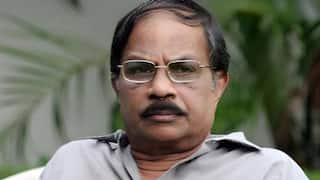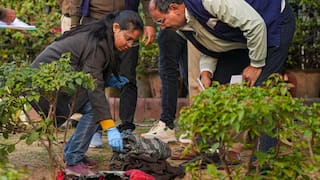Literature Nobel For 2024 Goes To South Korean Author Han Kang For Prose That 'Exposes The Fragility Of Human Life'
South Korean author Han Kang has been awarded the 2024 Nobel Prize in Literature for her powerful prose that confronts historical trauma and the fragility of human life.

Nobel Prize in Literature 2024: The Swedish Academy for Literature Thursday announced the Nobel Prize in Literature for 2024 to South Korean author Han Kang for "for her intense poetic prose that confronts historical traumas and exposes the fragility of human life”.
"The 2024 #NobelPrize in Literature is awarded to the South Korean author Han Kang “for her intense poetic prose that confronts historical traumas and exposes the fragility of human life," the Nobel Prize handle posted on Twitter.
BREAKING NEWS
— The Nobel Prize (@NobelPrize) October 10, 2024
The 2024 #NobelPrize in Literature is awarded to the South Korean author Han Kang “for her intense poetic prose that confronts historical traumas and exposes the fragility of human life.” pic.twitter.com/dAQiXnm11z
"In her oeuvre, Han Kang confronts historical traumas and invisible sets of rules and, in each of her works, exposes the fragility of human life. She has a unique awareness of the connections between body and soul, the living and the dead, and in her poetic and experimental style has become an innovator in contemporary prose," Anders Olsson, Chairman of the Nobel Committee, said about her.
WATCH LIVE: Join us for the 2024 Nobel Prize in Literature announcement.
— The Nobel Prize (@NobelPrize) October 10, 2024
Hear the breaking news first – see the live coverage from 13:00 CEST.
Where are you watching from?#NobelPrizehttps://t.co/iXgdMSoXST
Some of her prominent works in English include 'Convalescence' (translated from the Korean by Jeon Seung-Hee); 'The Vegetarian', 'Human Acts', 'The White Book', and 'Europa', translated from the Korean by Deborah Smith, among others.
ALSO READ ON ABP LIVE | Nobel Prize 2024: Check Full List Of Winners
Who Is Han Kang?
Born in 1970 in Gwangju, Han Kang emerged in the literary scene with poetry in 1993 and prose in 1995. Known for exploring intense, often traumatic themes, her breakthrough novel, 'The Vegetarian' (2007), examines society's violent responses to a woman’s quiet rebellion against societal norms. According to the Nobel Prize website, her works often explore bodily and psychological extremes, blending art and existentialism.
In 'Human Acts' (2014), she revisits the 1980 Gwangju massacre, portraying historical trauma with a visionary, poetic style that lends voice to the dead.
Other notable works include 'Greek Lessons' (2011), which explores loss and vulnerability through two flawed individuals, and 'The White Book' (2016), a reflective meditation on grief tied to the color white.
Her recent novel, 'We Do Not Part' (2021), reflects on shared mourning after the Jeju Island massacre, symbolising pain's persistence across generations. Han’s literature draws on Eastern philosophies, often intertwining physical and mental suffering, with an emphasis on unresolved pain, as seen in 'Convalescence' (2013) and 'Europa' (2012).
Across her works, Han Kang's approach remains evocative, marked by her unique style and themes of unhealed trauma and the unspeakable truths of human experience.
ALSO READ ON ABP LIVE | Chemistry Nobel 2024: Google DeepMind Scientists Among 3 Winners 'Who Cracked The Code For Proteins' Amazing Structures'
117th Literature Nobel
This is the 117th Literature Nobel to have been awarded until now. In 2023, Jon Fosse got the Nobel Prize in Literature “for his innovative plays and prose which give voice to the unsayable”.
The Nobel Prize in Literature had been awarded 116 times until now, with a total of 120 recipients between 1901 and 2023. The award has been shared between more than one person only on four occasions in the past — in 1904, 1917, 1966 and 1974. And it has never gone to one laureate twice.
There had been no Literature Nobel awarded in 1914, 1918, 1935, 1940, 1941, 1942, and 1943 — mostly during the time of World Wars.
In 1913, India's Rabindranath Tagore was honoured with the Nobel Prize in Literature for his "profoundly sensitive, fresh and beautiful verse".
The Nobel Prize has been awarded annually since 1901, recognising excellence in disciplines such as Physics, Chemistry, Medicine, Literature, Peace. Economic Sciences was added to the list later.
This year's Nobel prizes have been announced for physiology or medicine, physics, chemistry, and literature.
The 2024 Nobel Prize in Physiology or Medicine is being awarded jointly to Victor Ambros and Gary Ruvkun for their work on microRNA, while John J. Hopfield and Geoffrey E. Hinton are getting the Nobel Prize in Physics for 2024 for their "discoveries and inventions that enable machine learning with artificial neural networks".
The Nobel Prize in Chemistry for 2024 has been awarded to David Baker, Demis Hassabis, and John M. Jumper for their work on proteins, the "ingenious chemical tools" of life, with one half of the prize going to David Baker from the University of Washington, Seattle, for “for computational protein design”, and the other half to Google DeepMind scientists from the UK Demis Hassabis and John M. Jumper “for protein structure prediction".
The Nobel Foundation, created to manage the fund Alfred Nobel bequeathed his fortune to in his 1895 will, collaborates with different organisations to select and reward the laureates — the Royal Swedish Academy of Sciences for Physics and Chemistry, Karolinska Institute for Medicine, Swedish Academy for Literature, and the Norwegian Nobel Committee for Peace.
Trending News
Top Headlines




























